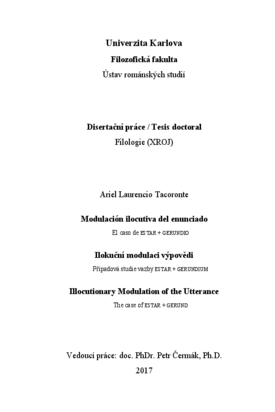Modulación ilocutiva del enunciado. El caso de estar + gerundio
Illocutionary Modulation of the Utterance. The Case of estar + gerundio
Ilokuční modulace výpovědi: případová studie vazby estar + gerundium
dizertační práce (OBHÁJENO)

Zobrazit/
Trvalý odkaz
http://hdl.handle.net/20.500.11956/95882Identifikátory
SIS: 152925
Kolekce
- Kvalifikační práce [25011]
Vedoucí práce
Oponent práce
Aurová, Miroslava
Gutiérrez Rubio, Enrique
Fakulta / součást
Filozofická fakulta
Obor
Románské jazyky
Katedra / ústav / klinika
Ústav románských studií
Datum obhajoby
26. 3. 2018
Nakladatel
Univerzita Karlova, Filozofická fakultaJazyk
Španělština
Známka
Prospěl
Klíčová slova (česky)
metaoperační|fázová teorie|invariantní hodnota|výpovědní proces|výpovědní gramatika|řečový akt|ilokuční hodnota|kontaktní hodnota|průběhová opisná vazbaKlíčová slova (anglicky)
metaoperational|phase theory|invariant value|enunciation|utterance grammar|speech act|illocutionary value|contact value|progressive periphrasisStudie zabývající se různými formami a strukturami jazyka obvykle považují za samo- zřejmé, že se tyto jednotky odvolávají na prvky nejazykové reality čili že jazyk odráží svět. V případě slovesných soustav jsou takovými prvky čas, aktionsart nebo vid. Vzhledem k tomu, že není možné spolehlivě popsat slovesné chování pomocí těchto kategorií, navrho- vaná řešení se neustále upravují a rozšiřují, výsledkem čehož jsou mnohdy obtížně aplikova- telné a příliš složité teoretické modely. Je to dáno rovněž tím, že závěry, k nimž se dochází, se soustavně dostávají do rozporu s jazykovou skutečností, která jim odolává a popírá je. Nezbývá tedy než uchylovat se ve vysvětleních k výjimkám nebo vyřadit segmenty vzpírající se navržené klasifikaci na periferii systému. Naším prvním cílem bude tedy nejprve stanovení předběžného teoretického rámce, oproti běžné aposteriorní teoretizaci založené na tom, co je vidět na povrchu. To nám umožní přiřadit jazykovým prvkům invariantní ústřední hodnotu. Vycházíme z metaoperačního sys- tému H. Adamczewského, podle něhož existují v jazyce operátory, jež náleží jedné ze dvou fází procesu vytváření výpovědi. Konkrétně se buď pojí svou rématickou povahou s propozicí informace, nebo svou tématickou povahou s presupozicí daného údaje. Tento vyložený princip by měl být striktně...
The studies of the different forms and structures of language usually take for granted that these refer to non-linguistic entities, i.e., that language reflects the world. In the case of verbal devices, such entities happen to be time, aktionsart or aspect. In view of the proven impossibility of giving an accurate account of the behavior of such devices by means of these categories, disquisitions and further elucidations are perpetuated, what complicates the pro- blem to not very judicious levels. Moreover, because the conclusions reached get equally in conflict with a linguistic reality which resists them, contradicts them. So there is no other choice left than to declare exceptions or special uses, or banish the insubordinate segments to the periphery of the system. Our first goal will therefore be the previous establishment of a theoretical framework, as a cure for the a posteriori theorizing based on what is seen on the surface, which would allow us to assign a possible invariant central value to linguistic elements, for which we will rely on the metaoperational system of H. Adamczewski. In it, such elements are operators defined by their belonging to one of two phases in the process of utterance assembly, namely, by a rhematic character, of proposition of the information, or by a thematic...
